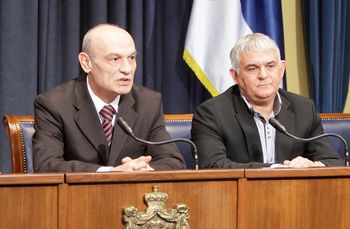- Serbia
Get to know Serbia
- Citizens
Culture and science
Health services
Pension and disability insurance
- Business
Employment
Economy
- Media
- Government
- Contact
Keep in touch
Contact form
Back
Keepin touch
Whether you have a question, comment, suggestion or any problem in the purview of the government, send us your message and we will try to respond as soon as possible. If your problem is not in our purview, we will forward your message to the relevant institution.
Q:
A:
Feasibility study for Morava Channel to be ready within two months
Belgrade,
25 March 2013
Minister of Natural Resources, Mining and Spatial Planning Milan Bacevic stated today that Chinese company China Gezhouba Group Corporation is expected to elaborate a feasibility study for the project of the Morava Channel navigation route.
Speaking at a press conference held after the first meeting of the Serbian-Chinese working group for realisation of this study, Bacevic said that this group consists of experts from various fields.
He explained that the feasibility study will show the justifiability of this project that would be part of the Danube-Morava-Vardar navigation route, and added that Serbia will not pay anything for the preparation of the feasibility study as that is envisaged by the protocol signed.
The Minister said that the Serbian side handed over to its Chinese partners the documents that are required for the study, and added that the talks on a possible start of works and the signing of the agreement might take place in the middle or late this year.
The construction of the Morava Channel is a big development opportunity for Serbia, Bacevic reiterated, adding that this navigation route would connect Western and Central Europe with Eastern Europe and the Aegean Sea by the shortest route.
He recalled that at a meeting of CEFTA in Skopje, the project of construction of the Danube-Morava-Vardar channel was rated as the most important infrastructure project for the Balkan Peninsula.
The Minister also announced that he will soon meet with the Prime Minister and the President of Macedonia in order to discuss the possibility of participation of that country in the implementation of this project.
Acting Director of the Serbian Agency for Spatial Planning Dragan Duncic said that the spatial plan for the construction of the Morava Channel should be completed by the end of July.
The plan will be multifunctional and apart from the navigation system, it will include parts relating to the protection of the environment and agriculture, and flood and erosion control, and will take into account natural and economic and social aspects, namely cities, ports, industrial and customs zones, Duncic explained.
He explained that the feasibility study will show the justifiability of this project that would be part of the Danube-Morava-Vardar navigation route, and added that Serbia will not pay anything for the preparation of the feasibility study as that is envisaged by the protocol signed.
The Minister said that the Serbian side handed over to its Chinese partners the documents that are required for the study, and added that the talks on a possible start of works and the signing of the agreement might take place in the middle or late this year.
The construction of the Morava Channel is a big development opportunity for Serbia, Bacevic reiterated, adding that this navigation route would connect Western and Central Europe with Eastern Europe and the Aegean Sea by the shortest route.
He recalled that at a meeting of CEFTA in Skopje, the project of construction of the Danube-Morava-Vardar channel was rated as the most important infrastructure project for the Balkan Peninsula.
The Minister also announced that he will soon meet with the Prime Minister and the President of Macedonia in order to discuss the possibility of participation of that country in the implementation of this project.
Acting Director of the Serbian Agency for Spatial Planning Dragan Duncic said that the spatial plan for the construction of the Morava Channel should be completed by the end of July.
The plan will be multifunctional and apart from the navigation system, it will include parts relating to the protection of the environment and agriculture, and flood and erosion control, and will take into account natural and economic and social aspects, namely cities, ports, industrial and customs zones, Duncic explained.
-
 Belgrade, 22 January 2025
Belgrade, 22 January 2025Egypt one of Serbia’s closest partners on international stage
-
 Belgrade, 9 July 2024
Belgrade, 9 July 2024Support for 104 associations in diaspora that preserve Serbian language, culture
-
 Belgrade, 15 April 2024
Belgrade, 15 April 2024Competition for StarTech grants open until 31 May
-
 Belgrade, 2 October 2023
Belgrade, 2 October 2023Serbia respects Resolution 1244 and will do everything to preserve peace
-
 Belgrade, 13 September 2023
Belgrade, 13 September 2023Day of Serbian Unity to be celebrated outside borders of Serbia, Republika Srpska for the first time
-
 Belgrade, 8 August 2023
Belgrade, 8 August 2023RSD 24.2m in state aid paid out to citizens affected by storm
-
 Belgrade, 17 June 2023
Belgrade, 17 June 2023Belgrade is doing everything to preserve peace in Kosovo and Metohija
-
 Belgrade, 15 June 2023
Belgrade, 15 June 2023Slovenia will continue to support Serbia on its way to EU
-
 Belgrade, 5 May 2023
Belgrade, 5 May 2023Emergency measures, tightening of conditions for possessing weapons
-
 Belgrade, 3 May 2023
Belgrade, 3 May 2023Three days of mourning in Serbia over tragedy at Vladislav Ribnikar primary school

